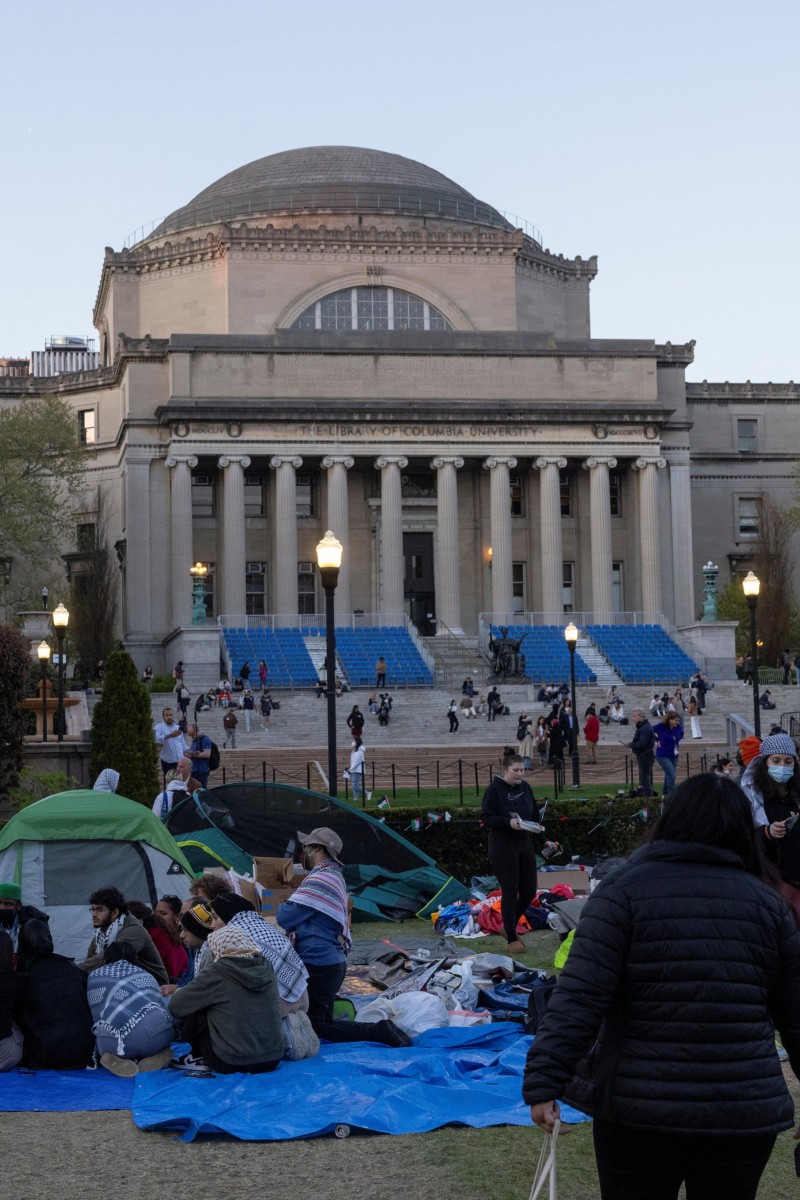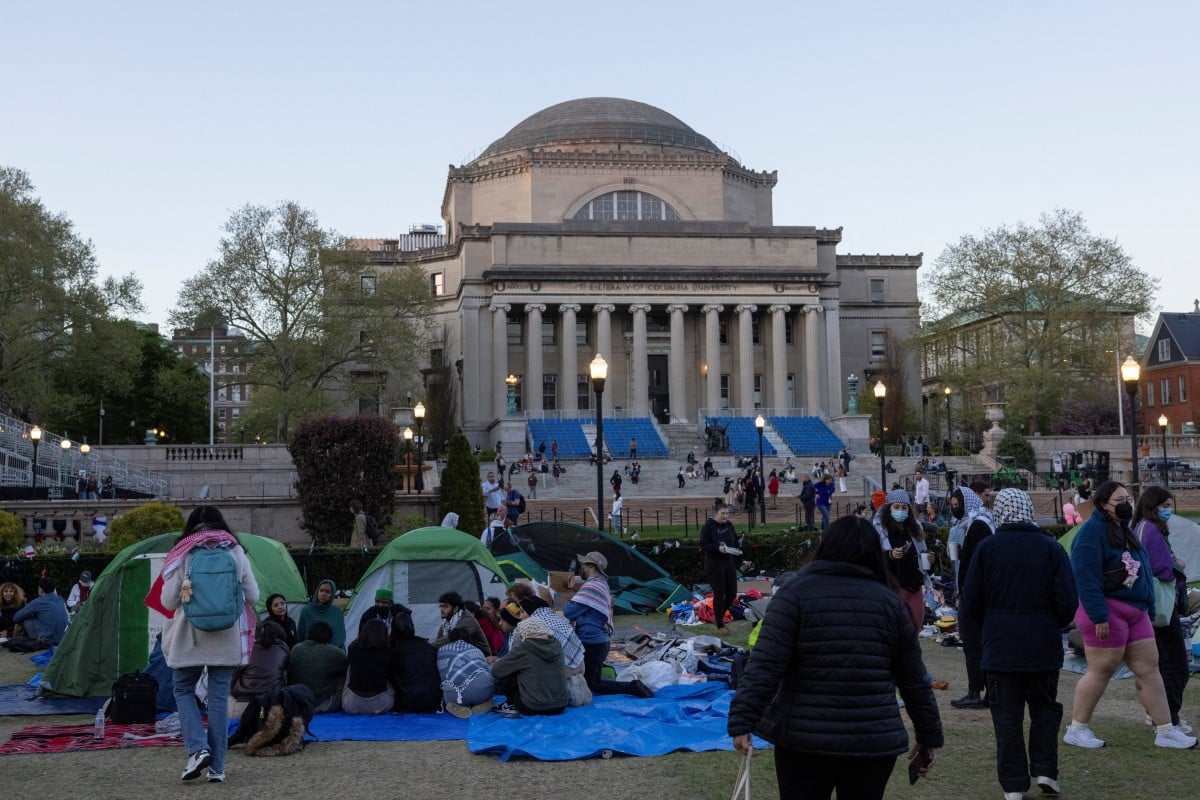
Sombre mood at Columbia University in the US as student protests continue amid Israel-Gaza war; rallies spread to other campuses
- Students and alumni are demanding the school divest from companies with ties to Israel and showing support for Palestine; demonstrations continue despite more than 100 arrests
- Some Jewish students say the university is not doing enough to protect them and that the protests have drawn violent outsiders to campus
 Students prepare to spend another night maintaining a protest encampment in support of Palestinians on the Columbia University campus. Photo: Reuters
Students prepare to spend another night maintaining a protest encampment in support of Palestinians on the Columbia University campus. Photo: ReutersYazen has slept on Columbia University’s south lawn almost every night for more than a week now, one of several dozen students living at the prestigious school’s “Gaza Solidarity Encampment.”
The 23-year-old Palestinian-American has been splitting his days between his medical studies at Columbia’s historic Butler Library, adjacent to the smooth green lawn, and the upkeep of the colourful tents on the school’s main campus, in the heart of New York City.
Dozens of students and alumni have come together to express solidarity with Palestinians in Gaza, where Israel is waging war against militant group Hamas.
They are demanding Columbia divest from companies with ties to Israel – and the demonstrations are spreading to other campuses around the United States.
A burgeoning number of protesters now keep vigil daily at Columbia, though numbers ebb and flow from the dozens to the hundreds as students join just for the day, leave to study – or, in Yazen’s case, go home to feed his cat.
“Millions of Palestinians in Gaza are sleeping out in the cold every single night without access to food and shelter,” said Yazen, who did not give his surname.
“We have tents, they don’t have tents,” he said.
Famine fears rise in northern Gaza as UN agency stops food deliveries
He’s determined to stay, even after the university last week called in the police, leading to the arrest and suspension of more than 100 students.
“As a Palestinian, is it my responsibility to be here and show my solidarity with the people in Gaza? Absolutely,” Yazen said.
Universities have become the focus of intense cultural debate in the United States since the war broke out, as a humanitarian crisis grips the Palestinian territory of Gaza.
The protest at Columbia has hosted speakers and music performances, Islamic prayers and seder meals for the Jewish holiday of Passover.
The October 7 Hamas attack on Israel resulted in the deaths of 1,170 people.
Israel estimates 129 of the roughly 250 people abducted during the Hamas attack remain in Gaza, including 34 who the military says are dead.
In Israel’s blistering military offensive in Gaza, 34,262 people have been killed, most of them women and children, according to the territory’s health ministry.
Musk’s X aiding influencers to capitalise on Israel-Gaza war misinformation
The Middle East conflict is inflammatory in the United States, and as the death toll in Gaza rises – and university authorities up the pressure on the demonstrators to dismantle the encampment – the mood on campus has become uneasy.
This week, in-person classes at Columbia were cancelled.
University authorities are caught between condemning antisemitism while allowing the protesters to exercise free speech.
But it is a thin line. Tensions reached their peak last week when university authorities called in the police, but it is not just the demonstrators who are feeling the heat.
Melissa Saidak, a Jewish graduate student at Columbia’s School of Social Work, said the protest has also drawn throngs of more aggressive and often violent outsiders to Columbia’s gates.
“A person was yelling at me, screaming at me, calling me a Zionist and a murderer. They were banging a pot or something,” said Saidak, who wears a dog tag in solidarity with Israeli hostages in Gaza and a Star of David around her neck.
“It was causing me a lot of physical pain, this was just me trying to get home.”
She thinks Columbia is not doing enough to protect Jewish students – particularly with being transparent and explicit about the harm done to them.
“School has continued to make it a lot worse,” she said.
University president Minouche Shafik had set a deadline of midnight on Tuesday to resolve the unrest.
Immediately after that announcement, which came near midnight, hundreds more people flocked to the protest, their numbers spilling over the pavements and another lawn.
In a frenzied confusion, demonstrators rushed to clear the camp, carrying half-disassembled tents and bags of supplies away.
But then the deadline was extended for another 48 hours, with the school agreeing not to call in the police or the National Guard.
Student organisers called it an “important victory,” citing fears of “a second Jackson State or Kent State massacre” – referring to two 1970 incidents in which authorities faced off against student protesters, with fatal consequences.
By Wednesday morning the encampment had returned to regular programming.
For now – despite the new looming deadline – it shows no sign of letting up.